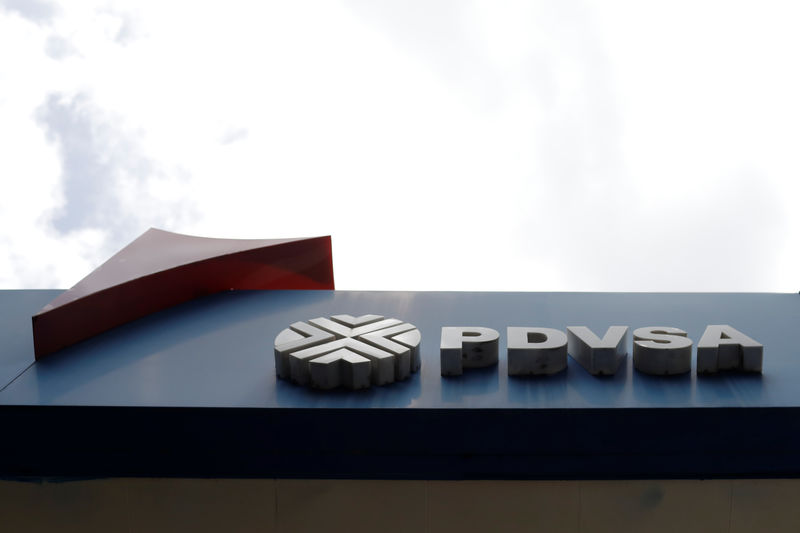By Luc Cohen
BUENOS AIRES (Reuters) - As Venezuela's state-owned oil company PDVSA saw its finances devastated by low oil prices and mismanagement, it funnelled millions of dollars to Petrolera del Conosur (BA:PSUR), a loss-making Argentine gas station operator it controls.
PDVSA decided to cut off the support payments late last year, according to a person familiar with Petrolera del Conosur's operations, as the once-proud icon of Venezuelan oil production struggled with declining output aggravated by a worsening economic crisis.
The transfers had totalled $89 million (69.9 million pounds) between 2013 and 2017, according to a Reuters review of filings with Argentina's securities regulator, years that coincided with a frustrated effort by Venezuela to extend the petro-diplomacy it employed in the Caribbean to the southern cone of Latin America.
Profitability was likely never the true goal of Venezuela's Argentina foray, said David Mares, a political science professor at the University of California, San Diego. In 2006, late President Hugo Chavez unveiled a plan to transform PDVSA from a commercial company to a domestic and international political tool.
Before oil prices crashed in 2014, Venezuela's government used PDVSA to fund social programs at home and provide countries in the region with cheap fuel to promote its socialist model and push back on United States influence.
The most well-known example is Petrocaribe, a programme through which Venezuela sends crude and fuel to Caribbean countries on generous credit terms or through barter deals. But Chavez also signed deals with governments elsewhere in the region, including Argentina and Uruguay, to sell fuel and invest in energy infrastructure.
"The idea of having a series of gasoline stations in Argentina would fit in that context. It's to show the Bolivarian revolution benefits people at the ground level," Mares said. "The surprise is that they've lasted so long, because PDVSA is broke, the country is broke."
PDVSA in 2006 purchased a 46 percent stake in Conosur from Uruguay's ANCAP, which it boosted to a controlling 94 percent in 2010. PDVSA's website still boasts of a goal to run 600 stations in Argentina to gain a market share of 12 percent in the country.
Conosur's struggles come as some of PDVSA's other overseas ventures, most launched through a wave of overseas expansion in the 1980s or as part of Chavez's attempts to use "oil diplomacy," have been scaled back or shuttered.
One of the most emblematic is Hovensa, a refinery in the U.S. Virgin Islands operated jointly with Hess Corp (N:HES), that filed for bankruptcy in 2015.
'STRATEGIC ALLIANCE'
Since 2013, Conosur has posted hundreds of millions of pesos in annual losses. Fuel sales at its PDV Sur and Sol-branded stations have plunged 86 percent, as it struggled to compete with rivals like state-owned YPF (BA:YPFD), which produce their own crude and refine their own fuel.
PDVSA also strove to become an integrated player in Argentina, but efforts to acquire upstream and refining assets never worked out, the person said.
Neither PDVSA nor PDVSA Argentina, the subsidiary that owns the Conosur stake, responded to requests for comment.
And in a sign of how Venezuela's economic crisis has derailed its ambitions to challenge U.S. diplomatic and financial power through regional energy integration, Conosur has not notified Argentina's stock watchdog of any payments from PDVSA since Dec. 29, 2017.
The choice to cut off support amounts to a formal abandoning of the upstream goals in favour of strengthening the existing network as part of a restructuring of the company, said the person, speaking on condition of anonymity because they were not authorised to speak publicly.
"The supports were rational when the goal was the whole supply chain," the person said, adding the company was in talks for a strategic alliance with a fuel supplier to access cheaper refined products, rather than depending on the spot market.
That deal could be necessary to keep the company alive without PDVSA's support.
The company posted a 177.5 million peso loss in 2017, and warned on Dec. 20 that PDVSA's transfers had helped it avoid being dissolved in accordance with the requirements of an Argentine corporate law for companies that run out of capital.
Since then, losses have accelerated, to the tune of 226 million pesos in the first half.
Conosur's struggles have dashed many employees' hopes that PDVSA's takeover would signal a new era of prosperity at the chain, which had also struggled under Uruguayan ownership.
"We saw it as a panacea," said one former employee, laid off earlier this year with around a dozen others. "But it was more or less the same."
